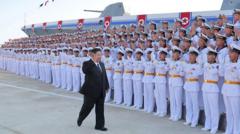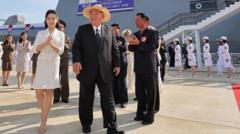In a significant move, North Korea has agreed to send 5,000 workers and 1,000 engineers to assist in reconstruction efforts in Russia's Kursk region, where North Korean troops previously engaged in combat alongside Russian forces against Ukraine.
North Korea Sends Thousands of Workers to Rebuild Russian Border Region

North Korea Sends Thousands of Workers to Rebuild Russian Border Region
North Korea's construction labor force is heading to Russia to assist in rebuilding efforts, highlighting the strengthening ties between the two nations.
North Korea is dispatching a substantial contingent of construction workers to Russia, intended to aid the rebuilding of areas devastated by conflict. According to Russian officials, Sergei K. Shoigu—who is closely associated with President Vladimir Putin—announced the workers’ deployment following a meeting with North Korean leader Kim Jong-un in Pyongyang. Shoigu characterized this as a step forward in the bilateral cooperation between Russia and North Korea, emphasizing that President Putin had given a directive for the initiative to proceed.
The contingent will consist of 5,000 construction workers alongside 1,000 sappers, or combat engineers, specifically tasked with demining operations in the war-affected Kursk region. While North Korean state media has yet to confirm these details, Shoigu’s remarks highlight a new phase in the partnership after his earlier visits to the North.
Reports from South Korean intelligence indicate that approximately 15,000 North Korean workers are presently working within Russia, despite the activity being contrary to U.N. Security Council sanctions. This arrangement serves a dual purpose: it provides much-needed foreign currency for North Korea, while simultaneously offering Russia a crucial labor source amid its workforce shortages due to the ongoing war with Ukraine.
The contingent will consist of 5,000 construction workers alongside 1,000 sappers, or combat engineers, specifically tasked with demining operations in the war-affected Kursk region. While North Korean state media has yet to confirm these details, Shoigu’s remarks highlight a new phase in the partnership after his earlier visits to the North.
Reports from South Korean intelligence indicate that approximately 15,000 North Korean workers are presently working within Russia, despite the activity being contrary to U.N. Security Council sanctions. This arrangement serves a dual purpose: it provides much-needed foreign currency for North Korea, while simultaneously offering Russia a crucial labor source amid its workforce shortages due to the ongoing war with Ukraine.




















